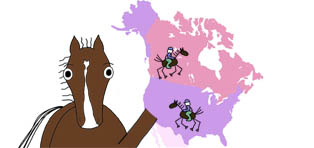Sportsillustrated.cnn.com - Full Article
September 14, 1987
Demmie Stathoplos
The Tevis Cup, a 100-mile cross-country horse race, is a real cliff-hanger
It's past 4 A.M. in Squaw Valley, Calif.—the dead of night, the hour of the wolf, when sane people are sleeping under warm blankets, not standing in the chilly blackness at the eastern edge of the Sierra Nevada waiting for a horse race to begin. Phantom horses with ghostly riders, or so they seem in the silver wash of the spotlights, clip-clop toward the starting line of the Western States 100 Miles One Day Ride, otherwise known as the Tevis Cup. This is the toughest single race in the world of endurance riding, a once-obscure sport now blossoming in the American West and around the world.
As the five o'clock starting time draws near, 271 horses and their riders crowd behind the low aluminum barrier that serves as a starting line for the race. To start the race, the horses pass, two by two, through a gap in the barrier. The mountain air trembles with sound: A thousand hooves scrape the gravel, and horses nicker and scream as their riders, some wearing surgical masks to keep from breathing the clouds of dust that fill the air, urge them toward the clogged gap. The onlookers—family and friends who will serve as support crews—call out words of encouragement as the horses thunder by like an Old West posse. A young girl shouts, "Good luck, Mom!"
There are a lot of moms in the Tevis Cup; in fact, more than half of the riders on this August morning are women. One of them is Juliette Weston Suhr, a 63-year-old grandmother from Scotts Valley, Calif. who's here to ride in her 23rd Tevis Cup. Her 39-year-old daughter, Barbara White, is riding in her 19th, and her husband, Bob, 68, heads their support crew, aided by son John and his wife, Stephanie.
The 100-mile race from Squaw Valley to the little town of Auburn (pop. 8,500) will be run over a trail, once used by the pony express, that climbs treacherously through the rugged mountains, traverses snow-filled passes and descends into canyons where the temperature may hit 120°. It's a test of stamina, courage and horsemanship. The idea, of course, is to finish first, but most of the riders have a more modest objective: to finish within the 24-hour limit. Those who do so win a silver belt buckle. Suhr already has 16 of them, and in the 1987 Tevis she's trying to become the first rider since the event was founded in 1955 to win 17. She is, she admits, addicted to this race.
Suhr is a handsome, whipcord-thin woman with a relentlessly sunny disposition and a will of steel. She's riding her 11-year-old Arabian bay gelding, H.C.C. (for Hyannis Cattle Company in Nebraska, where he was bred) Gazal, for the sixth straight year, and she's worried because Gazal has a crack in his left forehoof. "Before a race I get very nervous," she says. "I'm sure the horse is going to break a leg in the trailer, or come down with flu the day before, or fall off a cliff during the race." Clearly her concerns are not for herself but for her beloved Gazal; together they've won the Haggin Cup—given to the rider whose horse finishes in the top 10 and in the best physical condition—a record three times. This trophy is considered by many as important a prize as the Tevis Cup (named after Will Tevis, a famed American horseman in the early 1900s), which is awarded to the winner.
Suhr has never won the Tevis, but she has come close, having finished second in 1985 and third last year. Both times she held Gazal back in the final 15 miles to spare him, but she has no regrets. "I can honestly say the Haggin Cup is more important to me," she says. "On Sunday morning at the judging for the best-conditioned horse, some of those horses are pretty dragged out. Gazal has always whinnied, had his head up, and his eyes have been clear. It's always been my proudest moment to present him to the veterinary committee and the crowd in that condition."
Women do extremely well in the Tevis Cup race, and Suhr thinks it's because they have more empathy with their horses. She looks lovingly at Gazal. "He has such a kind eye," she says...
Read more here:
http://sportsillustrated.cnn.com/vault/article/magazine/MAG1066451/1/index.htm

No comments:
Post a Comment